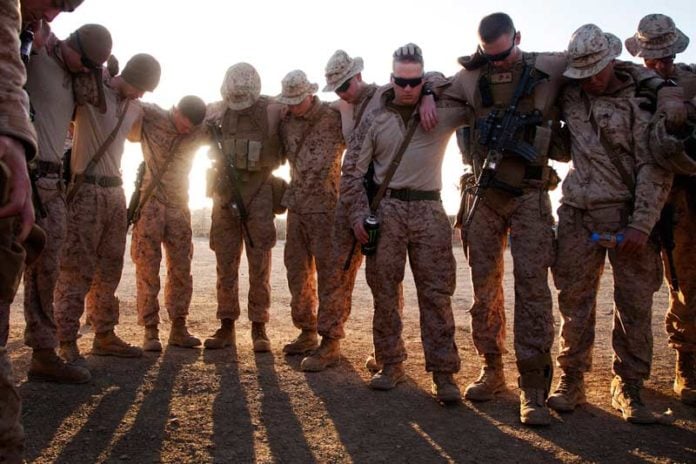Lance Corporal Monifa Sterling military career ended on February 1, 2014 when she was convicted at a court-martial at Camp Lejune, North Carolina for refusing to obey an order from a staff sergeant to remove a slightly altered the Old Testament Bible verse “No weapon formed against me shall prosper” from her desk.
According to her staff sergeant, the Scripture verse needed to be removed because it “could easily be seen as contrary to good order and discipline” of the Corps.
For refusing to obey the order, the Corps found Sterling guilty of “failing to go to her appointed place of duty, disrespect toward a superior commissioned officer, and four specifications of disobeying the lawful order of a noncommissioned officer.” As punishment, the court gave Sterling a bad conduct discharge and a reduction in rank from lance corporal to private.
Presently, Sterling is unemployed and looking for work – a situation made more difficult by virtue of her bad conduct discharge from the military.
This past week, Sterling’s case came to the attention of the Liberty Institute and volunteer attorney Paul Clement. According to a statement the Liberty Institute’s website:
“Clement has asked the Court of Appeals for the Armed Forces (CAAF) – the highest military court whose cases are subject to review by the Supreme Court of the United States – to review the case of Lance Corporal (LCpl) Monifa Sterling, USMC. LCpl Sterling was convicted at a court-martial for putting a Bible verse on her computer when she was stationed at Camp Lejune, North Carolina.
After being criminally prosecuted by the United States Government, LCpl Sterling initially represented herself, then appealed her case to the Navy-Marine Corps Court of Criminal Appeals.
She again cited her First Amendment rights to religious expression, as well as her protection under the Religious Freedom Restoration Act (RFRA). RFRA is a vital law that has been used in court to protect religious liberty in various contexts.”
In the face of certain defeat, Sterling sought out the Liberty Institute and the help of former U.S. Solicitor General Paul Clement, also a law professor at Georgetown University. In subsequent filings, the Liberty Institute said:
“…both the trial and the appellate court said RFRA did not apply because displaying a Bible verse does not constitute religious exercise. Sterling and her attorneys take issue with this opinion.”
According to Liberty Institute Director of Military Affairs and Senior Counsel Mike Berry:
“If the government can order a Marine not to display a Bible verse, they could try and order her not to get a religious tattoo, or go to church on Sunday.” “Restricting a Marine’s free exercise of religion is blatantly unconstitutional.”
Liberty Institute, and its stable of volunteer attorney’s including Paul Clement, has argued over 75 cases in the U.S. Supreme Court including the recent Hobby Lobby victory that held the abortion mandate in the Obamacare law unconstitutional because it violated the freedom of conscience rights of companies and individuals who oppose paying for abortion services or drugs on religious grounds.
With this experience as a guide, Clement is now asking the court to rule that the appellate court should have applied RFRA in LCpl Sterling’s case, protecting her right to post Bible verses as a form of religious exercise.
A decision that RFRA should have been applied would set a major precedent that could be used to protect others in the military who desire to express their faith while serving their country.
The controversy is also puzzling in this respect. The military career of every U.S. Marine begins with this Oath of Office:
“I do solemnly swear (or affirm) that I will support and defend the constitution of the United States against all enemies foreign and domestic; that I will bear true faith and allegiance to the same;
that I take this obligation freely; and without any mental reservation or purpose of evasion; that I will well and faithfully discharge the duties of the office on which I am about to enter; So help me God.”
What part of “So help me God”…“could easily be seen as contrary to good order and discipline” of the Corps?






























